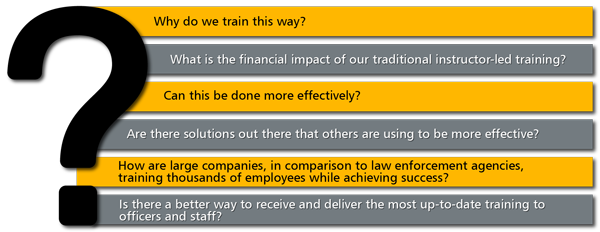By Mike Pomesky
Images by Natalie Diebold & Josh Spencer
One of the most significant challenges facing law enforcement today is having to develop a comprehensive financial plan incorporating progressive and relevant training for our staff. Law enforcement incorporates a high level of art (communication and interaction with people) and science (forensics). Many of these developed skills are perishable without the continued professional development of our officers and staff.
In an ideal world, law enforcement budgets would absorb unlimited training for our officers so they could receive the training they need for success. In reality, we know that is not possible.
Those factors, coupled with the increasing expectations of professionalism in the law enforcement community, led me to look at my department and how we train. Questions began to immediately arise:

These questions led me to look at instructor-led training vs. online learning options that are available out there for departments.
Instructor-led training (ILT) is the traditional and more formal version of training that takes place in a classroom in front of officers, while online learning is web-based and can be taken at any time from any internet-connected device. There are also blended learning environments.
If you’re trying to find the best training program for your employees, there are a few things to keep in mind and several factors I considered for my own police department when researching options to deliver more training.
- The high cost of implementation, both in terms of time and money
- Inconsistent messaging and teaching styles of instructors when courses are taught in multiple sessions leading to inconsistent work performance and questions by officers
- Time away from work
- Overtime created to back fill staffing shortages at the department along with overtime for the officer/staff being trained amplifies quickly
- Interruption to employee’s daily tasks
- Meals, travel, and overtime costs oftentimes run training budgets out and ultimately leave training plans short of incorporating all members of the department
Online learning offers solutions to many of these challenges. These solutions allow us to maximize our training plan financially and blend our instructor-led training in a more effective and efficient way. It also increases the number of hours we can train each officer/department staff member. This, in turn, increases the professional performance of our officers and the service we provide our community.
Online learning allows our staff to train anywhere and anytime. That cost reduction compared to an all instructor-led training program enables our department to purchase more equipment for our officers. Also, for the courses that require an instructor-led environment, we are able to focus on making them more effective.
Since it’s delivered online, online solutions can include videos, tests, activities, images, course materials, and policy in the training. These solutions are able to be revisited by an officer anytime they need to refresh their memory.
Online learning provides distinct advantages for police departments. There’s a reason that more Fortune 500 companies use online learning, and those organizations claim that online learning provides them with a distinct competitive advantage.
- Saving police departments money in terms of development hours, travel costs, meals, and employee time away from work
- Taking less time away from an employee’s workday, as online learning takes up to 40-60% less time than classroom instruction
- Allowing employees more flexibility to access training when and where they have the time to do so
- Allowing officers to go back and review the resources enabling them to perform at their peak
- Creating personalized, custom online content that can be tailored to match the police department and community needs
- Allowing employees to pause training, reread information, test on information, and immediately get more information as they complete a course
- Increasing employee retention of information, for specific subjects

Just like instructor-led training, online courses must focus on the core principles of instructional design, relevant material, and the delivery to accurately and concisely communicate information to your law enforcement employees.
Online learning has been slow to be accepted in law enforcement, but those traditional viewpoints are starting to change. It has been widely known for years that local schools, colleges and universities, and large successful worldwide corporations use online learning to maximize their employee development.
The most difficult challenge I have found in my own agency to overcome is the view that “online learning won’t work here”. In reality, after we implemented our online learning solution, the success of it was prevalent in each division of our police department. Blended learning options incorporate instructor-led training and online training. By using this approach in my police department, I have been able to accomplish more effective training for our officers and staff.
A U.S. Department of Education survey of over 1,000 independent studies showed instruction that combined online and face-to-face elements had a larger advantage than online training or instructor-led training alone. This new approach to training has enabled our police department to deliver more than 40 hours of advanced training for each officer annually. This keeps our officers and staff at their peak performance with the most up-to-date training.
Our officers are now receiving advanced training from national subject matter experts that, absent an online solution, would be un-affordable for us to provide. We also produce and host our own online department training. This enables us to immediately train our officers when there are legislative updates, forensic practice changes, advanced training, or other law enforcement changes that arise. This blended approach allows us to focus on the courses that truly need to be instructor-led with more resources.


